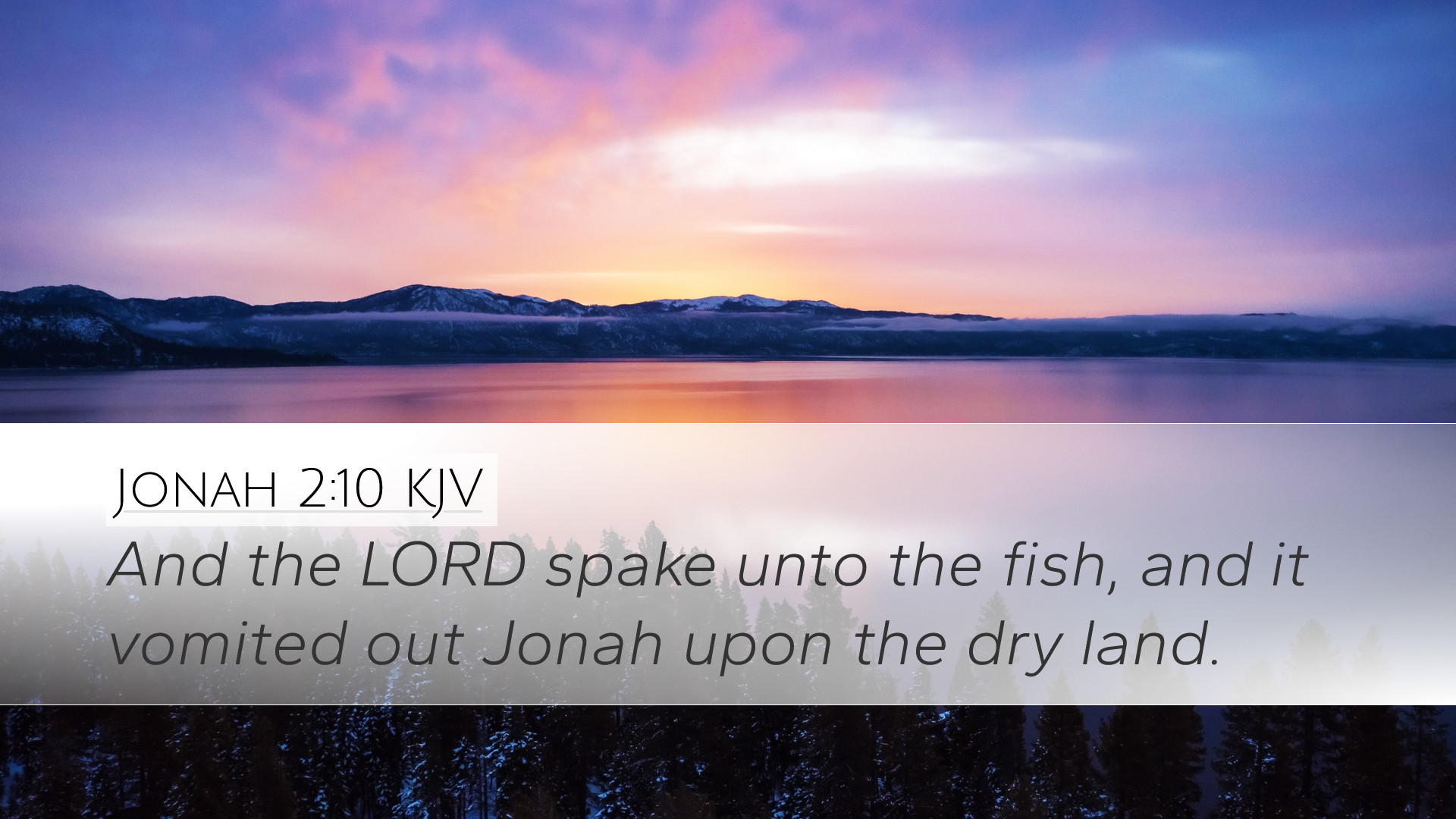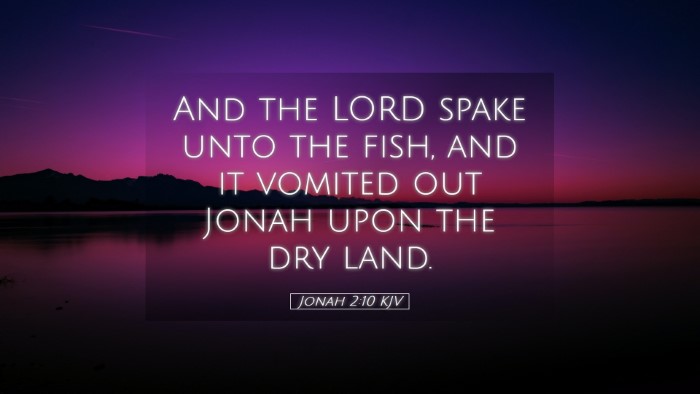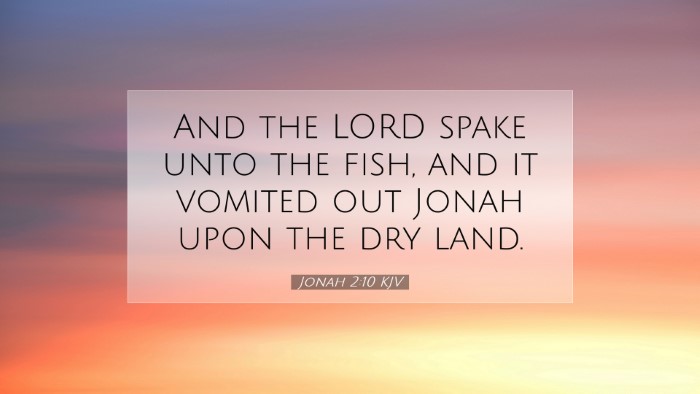Old Testament
Genesis Exodus Leviticus Numbers Deuteronomy Joshua Judges Ruth 1 Samuel 2 Samuel 1 Kings 2 Kings 1 Chronicles 2 Chronicles Ezra Nehemiah Esther Job Psalms Proverbs Ecclesiastes Song of Solomon Isaiah Jeremiah Lamentations Ezekiel Daniel Hosea Joel Amos Obadiah Jonah Micah Nahum Habakkuk Zephaniah Haggai Zechariah MalachiJonah 2:10
Jonah 2:10 KJV
And the LORD spake unto the fish, and it vomited out Jonah upon the dry land.
Jonah 2:10 Bible Commentary
Commentary on Jonah 2:10
“And the LORD spake unto the fish, and it vomited out Jonah upon the dry land.”
Introduction
The book of Jonah is one of the most profound narratives in Scripture, presenting themes of mercy, repentance, and God's sovereignty. Jonah 2:10 serves as a pivotal moment in this narrative, marking the transition from Jonah's time in the belly of the fish to his restoration. Public domain commentaries provide rich insights into the implications of this verse for understanding God's nature and His dealings with humanity.
Exegesis of Jonah 2:10
Within this verse, the action of God speaking to the fish underscores His absolute authority over all creation. The fish's obedience in vomiting Jonah reveals both the power of God and the significance of divine intervention in the story of His reluctant prophet.
-
Matthew Henry:
Henry emphasizes the idea of God's sovereignty. He notes that God can command the most unlikely of creatures to fulfill His purposes. The fish is described not merely as a means of punishment, but as an instrument for Jonah’s eventual deliverance, illustrating the dual aspects of God's discipline and His grace.
-
Albert Barnes:
Barnes highlights the notion of repentance that permeates the context of Jonah's prayer preceding this moment. He points out that Jonah’s change of heart leads to a divine response, demonstrating that God is attentive to our cries for mercy, even when they occur in our most desperate times.
-
Adam Clarke:
Clarke provides a linguistic analysis focusing on the term “vomited.” He emphasizes that it signifies a violent expulsion, which correlates with Jonah’s intense suffering in the fish. The emphasis here is on the stark contrast between Jonah's prior rebellion and the new lease on life bestowed upon him post-deliverance.
Theological Insights
Jonah 2:10 encapsulates several theological truths that reverberate throughout Scripture:
-
Divine Sovereignty:
This verse profoundly illustrates God's sovereignty over creation. He commands even the most fearsome sea creature, and it adheres to His will. This invites theological reflection on God's power and providence.
-
God’s Mercy:
God’s willingness to rescue Jonah despite his earlier disobedience points to the depth of His mercy. Jonah’s deliverance signifies that no one is beyond the reach of God’s grace, a theme common to many prophetic and narrative texts in the Bible.
-
Repentance and Restoration:
Jonah’s experience symbolizes the believer’s journey from rebellion to repentance. His vomiting from the fish signifies a new beginning—a physical and spiritual renewal—introducing themes of resurrection and redemption.
Contextual Relevance
Understanding Jonah 2:10 necessitates a grasp of its narrative context. The preceding verses depict Jonah’s dire circumstances and heartfelt prayer from within the fish. This verse follows Jonah's acknowledgment of God’s salvation, marking his physical and spiritual turnaround.
The broader context of the book involves God’s mission to Nineveh and Jonah’s initial flight from that calling. By the conclusion of chapter 2, there is a shift. Jonah, having reflected on his disobedience and God's mercy, is about to be recommissioned for his prophetic task.
Practical Application
For pastors, students, theologians, and scholars, Jonah 2:10 serves as a powerful reminder of several key Christian doctrines:
-
Hope in Despair:
Even when one feels ensnared by sin or dire circumstances, God is capable of delivering. The narrative reassures believers that God hears their cries, emphasizing prayer’s significance in moments of trial.
-
Responsive Faith:
Jonah's story encourages a responsive faith that acknowledges God's call. It challenges individuals to examine their own responses to God's directives and consider the implications of running away versus submitting to His will.
-
God's Pursuit:
God's relentless pursuit of His people, even in moments of rebellion, fosters encouragement. This reflects the heart of the Gospel and the lengths to which God will go to fulfill His purposes.
Conclusion
Jonah 2:10 stands as a testament to the complex interplay of divine sovereignty, mercy, and human agency. Understanding this verse through the lenses of various commentaries enriches our comprehension of God's nature and His relentless pursuit of humanity.
As we reflect on this pivotal moment in Jonah’s journey, let us be reminded of our own journey of faith, calling forth a commitment to embrace the tasks God sets before us and recognize His transformative power in our lives.


